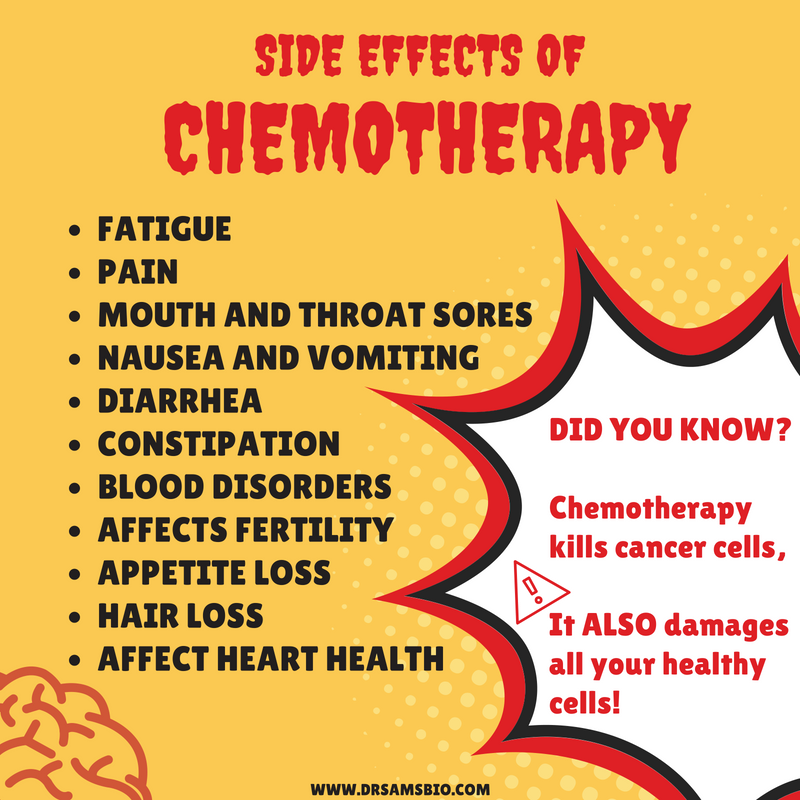Side Effects of Chemotherapy
Why does chemotherapy cause side effects?
Chemotherapy works on active cells. Active cells are cells that are growing and dividing into more of the same type of cell. Cancer cells are active, but so are some healthy cells. These include cells in your blood, mouth, digestive system, and hair follicles. Side effects happen when chemotherapy damages these healthy cells.
Common side effects of chemotherapy
- Fatigue. Fatigue is feeling tired or exhausted almost all the time. It is the most common side effect of chemotherapy.
- Pain. Chemotherapy sometimes causes pain. This can include:
- Headaches
- Muscle pain
- Stomach pain
- Pain from nerve damage, such as burning, numbness, or shooting pains, usually in the fingers and toes
- Mouth and throat sores. Chemotherapy can damage the cells inside the mouth and throat. This causes painful sores in these areas, a condition called mucositis.
- Diarrhea. Some chemotherapy causes loose or watery bowel movements.
- Nausea and vomiting. Chemotherapy can cause nausea (feeling sick to your stomach) and vomiting (throwing up). Whether you have these side effects, and how much, depends on the specific drugs and dose.
- Constipation. Chemotherapy can cause constipation. This means not having a bowel movement often enough or having difficult bowel movements. Other medications, such as pain medication, can also cause constipation.
- Blood disorders. Your bone marrow is the spongy tissue inside your bones. It makes new blood cells. Chemotherapy affects this process, so you might have side effects from having too few blood cells.
- Nervous system effects. Some drugs cause nerve damage. This can cause the following nerve or muscle symptoms:
- Tingling
- Burning
- Weakness or numbness in the hands, feet, or both
- Weak, sore, tired, or achy muscles
- Loss of balance
- Shaking or trembling
- Stiff neck, headache, or problems seeing, hearing, or walking normally. You might feel clumsy.
- Changes in thinking and memory. Some people have trouble thinking clearly and concentrating after chemotherapy.
- Sexual and reproductive issues. Chemotherapy can affect your fertility. For women, this is the ability to get pregnant and carry a pregnancy. For men, fertility is the ability to make a woman pregnant. Being tired or feeling sick from cancer or treatment can also affect your ability to enjoy sex.
- Chemotherapy can also harm an unborn baby, called a fetus. This is especially true in the first 3 months of pregnancy, when the organs are still developing.
- Appetite loss. You might eat less than usual, not feel hungry at all, or feel full after eating a small amount. If this lasts through treatment, you may lose weight and not get the nutrition you need.
- Hair loss. Some types of chemotherapy cause hair loss from all over your body. It may come out a little at a time or in large clumps. Hair loss usually starts after the first several weeks of chemotherapy. It tends to increase 1 to 2 months into treatment.
- Heart health: Some types of chemotherapy can affect your heart.
Long-term side effects. Most side effects go away after treatment. But some continue, come back, or develop later. For example, some types of chemotherapy may cause permanent damage to the heart, lung, liver, kidneys, or reproductive system. And some people have trouble with thinking, concentrating, and memory for months or years after treatment.
Nervous system changes can develop after treatment. Children who had chemotherapy may develop side effects that happen months or years after treatment. These are called late effects. Cancer survivors also have a higher risk of second cancers later in life.
You have to understand, that chemotherapy kills cancer cells, it ALSO damages all your healthy cells. It doesn’t target particularly on cancer cells!
Now, what if I tell you:
There is a better solution (In fact, the BEST one so far) to treat cancer!
The best thing is…it doesn’t cause these scary side effects!
Contact us to find out how it works! *FREE CONSULTATION*

